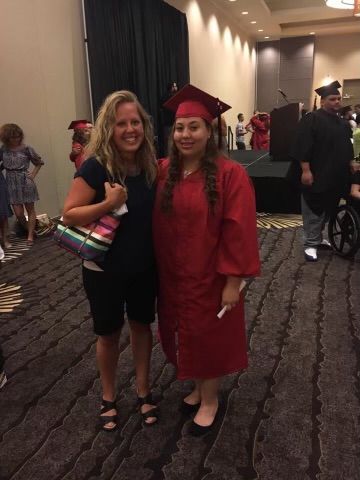
Rendering of Knight's Keep space.
Reading School District

Rendering of Knight's Keep space.
Reading School District

Reading School District
Rendering of Knight's Keep space.
During her senior year of high school in Reading, Amanda Garcia’s mind was more focused on finding a place to live than on trigonometry.
She and her family had been evicted and she was living at a friend’s house, working at a McDonald’s to save for an apartment. She was failing her math class.
“I was just like, ‘after high school, if I don’t have this class, it’s not the end of the world. I don’t have a diploma because I have a job, and I need that in order to get the apartment so that I’m not homeless. What’s this piece of paper going to do for me?’“ Garcia said. “I shouldn’t have been thinking like that, but I just knew I knew that I needed a roof over my head.”
Hundreds of students in the Reading School District experiencing homelessness are dealing with similar realities. In some cases, finding the next place to take a shower and sleep for the night takes priority over studying for tests and participating in extracurricular activities.
To help these students, the district is opening a dedicated lounge and study space at Reading High School. It’s called the Knight’s Keep, and is an expansion of the Knight’s Closet, which provides food, hygiene supplies and other essentials for unhoused students.
Leanne Eckenrode, the district’s coordinator of social work services, said she and her colleagues noticed the successful Knight’s Closet was not meeting all the needs.
“We were still having conversations with students, and they didn’t come to school, because they didn’t have clean clothing to wear that day, or they hadn’t had a shower in a few days, and so so they didn’t want to be sitting in class without that need being met, understandably so,” Eckenrode said. “So we thought that a great way to do that would be to just have it in house and provide those needs for our students. So they could just focus on coming to school that day.”
The new space will have a kitchenette, showers, lockers, study rooms and a living room with entertainment. The Knight’s Keep does not provide overnight accommodation, but it helps connect students with nearby overnight centers, such as Mary’s Shelter.
The project is to be completed before the start of the next school year and another Knight’s Keep is being planned for the district’s STEM building, which is under construction.
Reading identified 887 students experiencing homelessness during the 2021- 2022 school year, according to data compiled by the Pennsylvania Department of Education. Data for 2022-2023 has not been released, but Eckenrode said the district identified 583 unhoused students – 275 of whom were high schoolers.
This school year, Eckenrode said, the district knows of 468 students experiencing homelessness.
“We have months left, so I would assume we’re going to surpass our numbers from last year,” Eckenrode said.

Amanda Garcia
Leanne Eckenrode, one of the Reading School District social services employees tasked with helping students experiencing homelessness, poses with Amanda Garcia at her high school graduation in 2016.
In 1987, the McKinney–Vento Homeless Assistance Act established guidelines for identifying public school students experiencing homelessness. Such students and their families lack a fixed, regular, or adequate nighttime residence. A fixed residence would be permanent, while regular means it is used on a normal or nightly residence. Adequate housing is sufficient for meeting physical and psychological needs. A student missing even one of these qualifies for services.
But often, because of stigma or fear that parents will get angry at them, students do not speak out about their unstable housing situations.
Allyssa Kovich is a program specialist at Berks County Intermediate Unit’s PA Education for Children and Youth Experiencing Homelessness program. She said there are red flags teachers should watch out for if they suspect one of their students is experiencing homelessness.
It could be that a student is consistently unprepared for school and does not have school supplies. It’s difficult to contact the parent, or their parent does not have contact information on file. The student might be protective of their personal belongings, a backpack, for example.
“We ensure that teachers are aware of who the homeless liaison is in their school district, and let them know that they if they are questioning a student’s housing status, if they’re worried about a student in general, but they’re not 100% sure, just to inform the homeless liaison, and then they will take the protocol to talk to the student or talk to the family,” Kovich said.
Amanda was not able to graduate with her classmates in 2016 because she failed trigonometry, but with the help of Eckenrode, she was able to enroll in summer school and eventually was able to graduate in August. She also got an apartment, which she was able to equip with kitchen essentials, such as pots and pans, with the help of the Knight’s Closet.
Now, at 26, Garcia has two small children, a job at a dessert factory in Reading and a fiancé. She’s considering applying to a college program.

A collection of interviews, photos, and music videos, featuring local musicians who have stopped by the WITF performance studio to share a little discussion and sound. Produced by WITF’s Joe Ulrich.
The days of journalism’s one-way street of simply producing stories for the public have long been over. Now, it’s time to find better ways to interact with you and ensure we meet your high standards of what a credible media organization should be.